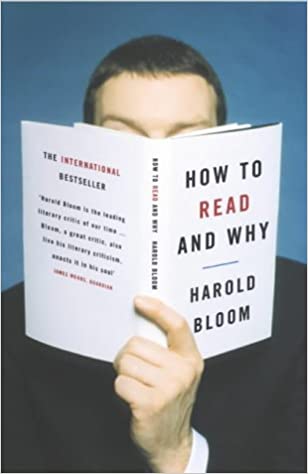
|
How to Read and WhyHarold Bloom |
All these formidable talents...
All these formidable talents have been subsumed by American media realities; who can match television news and talking heads, and even the daily New York Times, in self-parody? Reality in America is more grotesque and hilarious than any parodist could hope to trump.
As I lay dying...
As I lay dying portrays the human condition as being catastrophic, with the nuclear family the most terrible of the catastrophes.
His spirit is ready...
His spirit is ready (willing) and his flesh is not weak. He dies extraordinarily, to the music of his own: “Let it be.” No death in secular literature haunts the reader more. Why? Hamlet’s final words - “the rest is silence” - are spiritually ambiguous, yet I read them as anticipating annihilation rather than resurrection. Therein may be the best answer to the question “Why read Hamlet?” He does not die a vicarious atonement for us, but rather with the single anxiety of bearing a wounded name. Whether we ourselves expect annihilation or resurrection, we are likely to end caring about our name. Hamlet, the most charismatic and intelligent of all fictive characters, prefigures our hopes for courgae at our common end.
Proust defined friendship...
Proust defined friendship as being “halfway between physical exhaustion and mental boredom,” and said of love that it was “ striking example of how little reality means to us.”
Of death, Proust remarks...
Of death, Proust remarks that it cures us of the desire for immortality […].
Nietzsche, in one of his...
Nietzsche, in one of his most Hamlet-like formulations, advised us that what we could find words for, was something already dead in our hearts, so that there was always some kind of contempt in the act of speaking.
It's perhaps a historical pecularity...
It’s perhaps a historical pecularity, but we also lack a living woman poet who can rival Emily Dickinson and Elizabeth Bishop. Ideological cheerleading does not necessarily nurture grat, or even good, readers and writers; instead it seems to malform them.
Lust is the hero-villain...
Lust is the hero-villain of this night-piece of the spirit, male lust for the “hell” that concludes the sonnet, hell being the Elizabethean-Jacobean slang for the vagina. The ancient commonplace of sadness-after-coition achieves its apothesis in Sonnet 129, but at more than the expense of spirit. So impacted is this sonnet’s language that it evades its apparent adherence to the Renaissance believe that each sexual act shortens a man’s life.
I love "Sir Patrick Spence"...
I love “Sir Patrick Spence” because it has a tragic economy almost unique in its stoic heroism. There is a sense throughout the poem that heroism is necessarily self-destructive, and yet remains admirable.
The pleasures of reading...
The pleasures of reading indeed are selfish rather than social. You cannot directly improve anyone else’s life by reading better or more deeply. I remain skeptical of the traditional social hope that care for others may be stimulated by the growth of individual imagination, and I am wary of any arguments whatsoever that connect the pleasures of solitary reading to the public good.
The accent of belatedness...
The accent of belatedness is cought and held perfectly, in what we finally see is the saddest kind of love lyric, one that memorializes only a drem of youth.
Self-improvement is a large enough project...
Self-improvement is a large enough project for your mind and spirit: there are no ethics of reading. The mind should be kept at home until its primal ignorance has been purged; premature excursions into activism have their charm, but are time-consuming, and for reading there will never be enough time.
Nostalgia for lost illusions...
Nostalgia for lost illusions, loves that never quite were, happiness perhaps only tasted - these are the emotions Calvino evokes. In Isidora, one of the Cities of Memory, “the foreigner hesitating between two women always encounters a third,” but alas you can arrive at Isidora only in old age.
More than a comedian of genius...
More than a comedian of genius, [Flannery O’Connor] had also the penetrating insight that religion for her countrymen and -women was not the opiate, but rather the poetry of the people.
Maupassant has learned...
Maupassant has learned from his teacher, Flaubert, that “talent is a prolonged patience” at seeing what others tend not to see.
We are indeed already in the "inferno of the living"...
We are indeed already in the “inferno of the living”. We can accept it, and so cease to be conscious of it. But there is a better way, and it might be called the wisdom of Italo Calvo:
…seek and learn to recognize who and what, in the midst of inferno, are not inferno, then make them endure, give them space.
Calvino’s advice tells us again how to read and why: be vigilant, apprehend and recognize the possibility of the good, help it to endure, give it space in your life.
In major short stories...
In major short stories, reality becomes fantastic and phantasmagoria becomes disconcertingly mundane. That may be why so many readers, these days, shy away from volumes of stories, and purchase novels instead, even when the stories are of much higher quality.
Short stories favor the tacit, they compel the reader to be active, and to discern explanations that the writer avoids. The reader, as I have said before, must slow down, quite deliberately, and start listening with the inner ear. Such listening overhears the characters, as well as hearing them; think of them as your characters, and wonder at what is implied, rather than told about them. Unlike most figures in novels, their foregrounding and postgrounding are largely up to you, utilizing the hints subtlely provided by the writer.
Frank O'Connor, who disliked Hemmingway...
Frank O’Connor, who disliked Hemmingway as much as he liked Chekhov, remarks in The Lonely Voice that Hemmingway’s stories “illustrate a technique in search of a subject,” and therefore become a “minor art.”